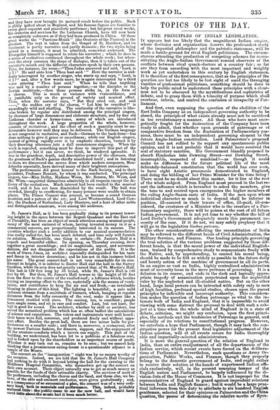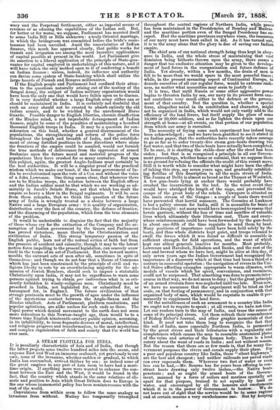TOPICS OF THE DAY.
THE PRINCIPLES OF INDIAN LEGISLATION.
IT appears but too likely that the magnificent Indian empire,
whose destinies and organization deserve the profoundest study of the impartial philosopher and the patriotic statesman, will be made a battle-ground for rival English politicians. The circum- stances attending the production of oompeting schemes for recon- stituting the Anglo-Indian Government remind observers of the conflicts between rival quack-doctors at a country fair ; so far are they from according with the most important and weighty work as yet undertaken in this century by English statesmen. are they from according with the most important and weighty work as yet undertaken in this century by English statesmen. It is therefore of the first consequence, that as the principles of the question are but too likely to be lost sight of amid the thronging vanities of professional politicians, something should be done to
help the public mind to understand those principles with a clear- ness not to be obscured by the mystifieations and sophiatries of debate, and to grasp them with a tenacity of purpose which shall overbear, inform, and control the confusion or incapacity of Par- liament.
And first, even supposing the question of the abolition of the East India Company as an independent governing authority to be closed, the principle of what exists already must not be sacrificed in too revolutionary a manner. All those who have most ener- getically fought for the destruction of the Company have been ready to admit, that whether upon grounds of patronage or of comparative freedom from the fluctuation of Parliamentary pas- sions, there must be an independent governing element in the future Anglo-Indian constitution. Lord Palmerston's proposed Council has not rallied to its support any spontaneous public opinion, and it is not probable that it would have received the seal of statutory sanction. His Government blandly proposed to absorb Hindostan into Downing Street—our Downing Street, incorruptible, respected of mankind!—as though it could make no difference to the future political life of the most • delicately-balanced constitution that the world has ever seen, to have eight Asiatic proconauls domesticated in England, and doing the bidding of her Prime Minister for the time being There must be no doubt about this matter, for it lies at the root of the whole subject. From England must proceed in the last re- sort the influence which is hereafter to select the members, give
the tone to and control upon emergencies the higher members of the ruling Anglo-Saxon caste of India. If the men upon whose individual character so much is to depend shall be inferior in
position, ill-assured in their tenure of office, ill-paid, ill-con- sidered, the creatures of a Minister who is the creature of a Par- liamentary majority, there will he poison at the root of all future Indian government. It is not yet time to say whether the bill of Lord Derby's Government adequately meets this paramount ne- cessity of the ease. If it do not, we may safely prophesy that it will go to the legislative limbus patrum. The other considerations affecting the reconstitution of India may be referred to the different heads of Civil Administration, the Military Services, and Finance. One leading principle governing the true solution of the various problems suggested by these dif- ferent heads, is that the moral power of the individual English-.
man, trained by comprehensive study to communicate freely with the Native, and, by apprehending, to control his moral being, should be made to be felt as widely as possible in the future daily and hourly action of the machine of government in all its parts.
In an empire so vast as India, highly centralized administration must of necessity issue in the mere pretence of governing. It is R
delusion in its course, and ends in the dark and logically appro- priate tragedy of assassination perpetrated upon the neglectful ruler by the neglected and ill-studied native. But on the other
hand, large local powers can be intrusted with safety only to men
of high faculties, profound special studies, chosen upon the purest principles by inflexible and mcorrupt authority. This considera- tion makes the question of Indian patronage so vital to the in-
terests both of India and England, that it Is impossible to avoid viewing with some distrust the proposal to deal with such a sub-
ject at a time when the whole mind of England is in a state of debate, criticism, we might say confusion upon the first princi- ples, the methods and, the tendencies of Patronage in general, and especially of its relations to constitutional progress. However, we entertain a hope that Parliament, though it may lack the con- structive power for the present final legislative adjustment of the Indian question, will at all events secure for India thoroughly able and impartially-selected administrators. It is more the general question of the relation of England to India, than an entire readjustment of all the departments of the
Indian service, which recent events have forced on the delibera-
tions of Parliament. Nevertheless, such questions as Army Or- ganization, Public Works, and Finance, though they properly
belong to the domestic government of India, and ought rather to receive their solution at the hands of experienced Indian offi- cials exclusively, will, in the present usurping temper of the English nation and Parliament, be largely influenced by the di- vision-lists of the House of Commons. It is not improper for the representatives of England to guard against imprudent relations between India and English finance ; but it would be a large prac- tical inference from this duty to attribute to sin hundred English gentlemen, selected for their opinions on Palmerston and the China question, The Tower of determining the relative merits of Ryot- wary and the Perpetual Settlement, either as imperial peens of revenue or' as educing the capabilities of the Indian sod. But, for better or for worse, we some, Parliament has married itself to some India Bill or Bills own : a truly Oriental marriage, in which the bridegroom was committed before the bride's coun- tenance had been unveiled. Amid the uncertainties of Indian finance, this much has appeared clearly, that public works. for transit and irrigation are among the most lucrative applications of capital possible at present in the world. Let Parliament give its sanction to a liberal application of the principle of State-gua- rantee for capital employed in undertakings of this nature, and it will have taken the only method open to it of conferring a benefit on Indian finance ; unless, indeed, its influence and authority can devise some system of State-banking which shall utilize the large hoards of Poonah and. Benares If the English people and Parliament had confined their atten- tion to the questions naturally arising out of the mutiny of the Bengal Army, the subject of Indian military organization would have been the only one that would have fallen upon us to discuss. It is very doubtful whether a large English army either can or should be maintained in India. It is certainly not doubtful that such an army should not be created to absorb entirely, the old Indian armies, and to be wielded by the unreformed Horse Guards: Possible danger to English liberties, chronic disaffection of the Hindoo mind, a not improbable derangement of Indian finance, might be some of the penalties of maintaining a hundred thousand English troops in India. It may be a question for con- sideration on this head, whether a general disarmament of the populations, the strengthening and reform of the police force throughout the length and breadth of India, and the establish- ment of strong fortified positions in those directions where alone the frontiers of the empire could be assailed, would not furnish the true methods of deliverance from the oppression of armed Brahmins upon the future moral and material progress of the populations they have crushed for so many centuries. But upon this subject, again, the greatest Anglo-Indians must certainly be the best authorities. It will be a singular proof of the practical wisdom which we make our boast, if the home government of In- dia be revolutionized upon the vote of a Cox and without the voice of a John Lawrence. One thing seems clear, that wherever there are to be Hindoo troops, the relation between the English officer and the Indian soldier must be that which we see working so ad- mirably in Jacob's Soinde Horse, not that which has dealt the empire so heavy a blow in the Bengal regiments. It will be seen from these remarks, that we think the question of the future army of India is wrongly treated as a choice between a large Native and a large European army : it is quality of organization, distribution over the face of the country, the defence of frontier, and the disarming of the population, which form the true elements of the problem. It would be undesirable to disguise the fact that the majority of those whose cry for the extinction of the Company and the as- sumption of Indian government by the Queen and Parliament has proved victorious, mean thereby the Christianization and civilization of India. This strong temporary passion of the English public, born not of the normal action of faith but from the pressure of accident and calamity, though it may be the latent motive force impelling to the present legislation, can scarcely avow itself lathe terms of an act of Parliament. But the inward motive moulds the outward acts of men after all, sometimes in spite of themselves: and though we do not fear that a House of Commons which has just been constrained by the principle of civil and re- ligious liberty to vote by an overwhelming majority for the ad- mission of Jewish Members, should seek to impose a statutable Christianity upon India, it may not be superfluous to warn some persons against trying to obtain per indirectum what is so evi- dently forbidden to wisely-religious men. Christianity must be preached in India, not legislated for, or subscribed for, or harangued for, in England. The future civilization of that strange peninsula must be the growth of ages under the influence of the mysterious contact between the Anglo-Saxon and the Hindoo intellect. Acts of Parliament, platform resolutions, and popular agitations, are alike useless for such ends as these. The Papal power which denied movement to the earth does not seem more ridiculous to this Newton-taught age, than would be to a futnre.time.English nineteenth-century public opinion, assuming, in its in. fallibility, to issue dogmatic decrees of moral, intellectual, and religions progress and transformation, to the most mysterious and complex organization of faith and society that the world has ever seen.



























 Previous page
Previous page